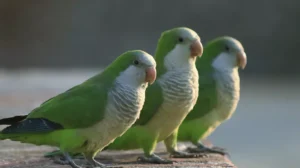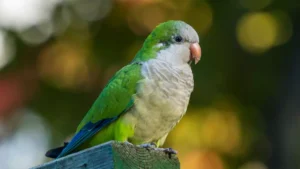Anyone who owns a Quaker parrot knows that they can be very lovable, but also very feisty creatures. If you’re looking to train your Quaker not to bite, there are a few things you can do.
First, it’s important to understand why your Quaker is biting in the first place. It could be that they’re feeling threatened or territorial, or they may simply be trying to get attention.
Once you know the reason behind the biting, you can begin working on training your bird not to do it. One of the best ways to train a Quaker not to bite is through positive reinforcement.
This means rewarding them when they don’t bite, instead of punishing them when they do. Try giving them their favorite treat or toy whenever they go without biting for a period of time.
You can also try using a clicker device to help teach them that good behavior is rewarded.
- Start with basic obedience commands such as “come,” “stay,” and “no”
- As your bird becomes more comfortable with you, you can begin to teach it tricks
- Quaker parrots are intelligent birds and can learn a variety of tricks
- Once your bird is trained, you can then begin working on specific behaviors such as not biting
- There are a few different techniques that you can use to train your bird not to bite, including positive reinforcement, negative reinforcement, and desensitization
- Choose the technique that you feel will work best for your bird and be consistent with it

Why Does My Quaker Parrot Keep Biting Me?
If your Quaker parrot is biting you, it could be because it’s feeling threatened or afraid. It could also be that the bird is trying to establish dominance over you.
Sometimes, Quaker parrots will bite their owners as a way of getting attention.
If your bird is biting you because it wants attention, try giving it more attention when it’s not biting. This may include talking to the bird more, petting it, and providing toys and other forms of enrichment.
If your Quaker parrot is biting out of fear or aggression, try working with a qualified avian behaviorist to help address the underlying issues.
How Do You Punish a Parrot for Biting?
There is no one-size-fits-all answer to this question, as the best way to punish a parrot for biting will vary depending on the individual bird’s personality and behavior.
However, some general tips on how to discipline a biting parrot may include scolding the bird verbally, squirting it with water, or placing it in time-out.
It is also important to make sure that the punishment is immediate and consistent in order to be effective.

How Do I Train My Bird to Not Bite Me?
If you have a pet bird, you may eventually find yourself on the receiving end of a bite. While it’s natural for birds to use their beaks for various activities such as eating and grooming, biting is usually a sign that your bird is feeling stressed or threatened.
If your bird has started biting, there are some things you can do to try to stop the behavior.
Try to identify what’s causing your bird to bite in the first place. Are there certain situations that seem to trigger the biting? For example, does your bird bite when you try to put them back in its cage?
Or does being around other people make them feel anxious? Once you know what’s causing the problem, you can take steps to address it.
If your bird is biting because they’re afraid of being put back in its cage, try making the cage a more inviting place.
Put some toys and perches inside so they don’t feel like they’re being isolated when they’re in there. You might also want to consider letting them out of their cage more often so they don’t associate it with being trapped.
If your bird is biting because they get scared around other people, slowly introduce them to different types of people one at a time.
Start with someone who doesn’t make sudden movements and is willing to sit quietly while your bird gets used to them.
As your bird becomes more comfortable, you can gradually introduce new people into its environment. It’s also important that you provide your bird with plenty of opportunities to exercise and explore its surroundings.
A bored or frustrated bird is more likely to start acting out by biting than one who feels like they have an interesting and stimulating life. Make sure they have plenty of toys to play with and space to fly around (if possible).
You might also want to consider taking them out on regular “bird adventures” where they can explore different environments under your supervision.
Finally, remember that patience is key when trying to train your bird not to bite. It will take time and consistency on your part, but if you stick with it, eventually your bird should learn that biting is not acceptable behavior.
How Do You Calm a Quaker Parrot?
If your Quaker parrot is feeling stressed or scared, there are a few things you can do to help calm them down. First, try offering them a favorite treat or toy.
Quakers love to play and explore, so providing them with something new to keep their attention can help take their mind off of whatever is upsetting them.
You can also try gently petting or stroking their head and back; many Quakers enjoy this type of physical contact and it can be very calming.
Finally, make sure that their environment is as quiet and peaceful as possible; loud noises and commotion will only aggravate a stressed Quaker. If you provide your parrot with plenty of love and care, they will soon feel right at home again in no time!
How to make Quaker parrot stop biting
How to Discipline a Quaker Parrot
When it comes to disciplining a Quaker parrot, there are a few key things you need to keep in mind. First and foremost, it’s important to remember that these birds are highly intelligent and social creatures.
As such, they require a great deal of mental stimulation and interaction with their human companions.
If they don’t get enough of these things, they can become bored and destructive. That said, here are a few tips on how to discipline your Quaker parrot:
- Establish clear rules and boundaries from the start. Let your bird know what behaviors are acceptable and which ones aren’t. Be consistent with your expectations and enforce them every time.
- Use positive reinforcement whenever possible. Reward your parrot for good behavior with treats, scratches, or other forms of attention. This will help reinforce the desired behavior while also strengthening the bond between you and your bird.
- Avoid using physical punishment as it can often do more harm than good. Instead, try using verbal cues such as “no” or “stop” when your bird is engaging in undesirable behavior.
- Startle techniques like squirting them with water may also work in some cases but should only be used as a last resort.
Conclusion
It is important to train your Quaker parrot not to bite for the safety of yourself and others. There are a few things you can do to help with this.
One is to provide your parrot with plenty of toys and chewable items so they have something else to focus their biting urges on.
You can also try training with positive reinforcement, such as offering a treat when your parrot refrains from biting. If all else fails, there are always professional bird trainers who can help you out.